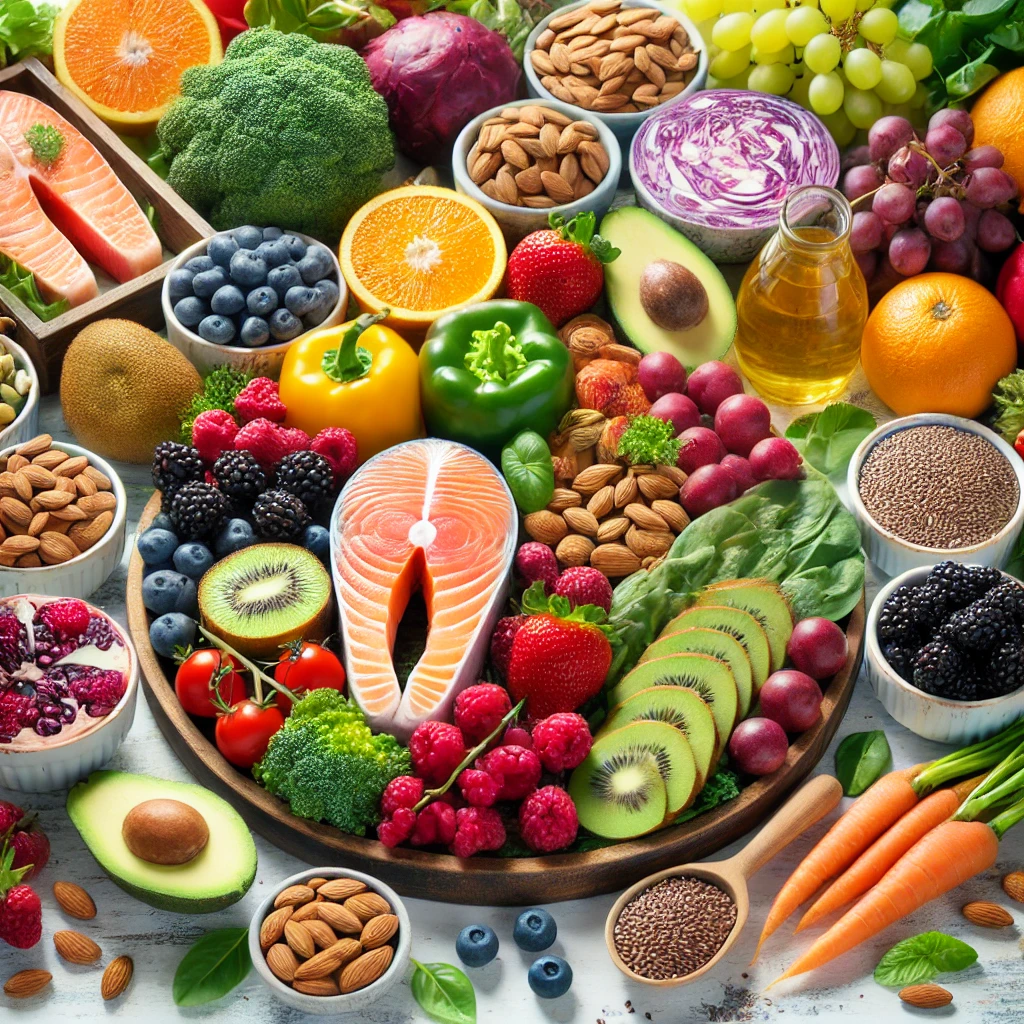Though it seems unlikely that we will ever fully reverse or halt many aspects of the aging process, an ever-growing list of habits, tools, and techniques can dramatically reduce the damage, signs, and symptoms associated with aging. While exciting new technologies continue to emerge, it’s essential to prioritize the foundations of physical and mental vitality—including a consistent, supportive nutrition pattern.
Some particularly important factors to consider when nourishing your health span include:

Hydration Habit
Water is essential for every aspect of our function and well-being, from our skin to our nervous system. Staying well-hydrated is one of the most powerful ways to support overall health, including the tone and texture of your skin.
To maintain hydration, keep plenty of sugar-free and caffeine-free beverages handy. Consider sipping on a protein-rich smoothie or bone broth, which provide not only hydration but also key amino acids and minerals to support overall health.
Consistency Over Perfection
While it’s easy to get caught up in the latest diet trends, research demonstrates that many balanced, whole-food-based nutrition patterns support health span.
Rather than striving for dietary “perfection,” focus on consistency with the nutritional patterns that best nourish you—both physically and mentally. Avoid letting the pursuit of a perfect diet become a barrier to long-term progress and well-being.
Set a Schedule
Intermittent fasting or a shortened eating window works well for some individuals, while others find that regularly timed meals and snacks better suit their body and lifestyle.
Be mindful of how your current meal schedule affects your nutritional needs, satiety, energy levels, and sleep. Additionally, many people benefit from avoiding food 2–3 hours before bedtime or at least primarily eating during daylight hours, which can optimize sleep and support overnight healing and detoxification.

Prioritize Protein
Since most of our body’s structures are composed of proteins and water, it’s essential to consume adequate protein to maintain these structures.
Some of the most protein- and micronutrient-dense options include:
- Animal-based: Wild-caught salmon, halibut, sardines, grass-fed whey protein isolate, and pasture-raised poultry or meats.
- Plant-based: Lupini beans, pumpkin seeds, pistachios, and almonds.
Focus on Fats
Omega-3 fatty acids play a crucial role in cellular health and function, yet modern diets are often deficient in them.
To ensure adequate intake, focus on anti-inflammatory fats from:
•Wild-caught, cold-water seafood (e.g., salmon, sardines, squid).
•Plant-based sources (e.g., chia seeds, sacha inchi seeds, ground flax, and hemp seeds).
If incorporating these foods regularly is challenging, consider supplementing with a high-quality omega-3 supplement.
Fiber-Forward
Fill your plate with fiber-rich, colorful produce. Whenever possible, choose local and seasonal fresh or frozen fruits and vegetables to naturally increase variety and nutrient density while reducing environmental impact.
A good goal is to aim for:
• 7–8 cups of raw produce daily, OR
• 3.5–4 cups of cooked/frozen produce daily.
If you’re new to a high-fiber diet, gradually increase intake by ½–1 cup per week to allow your digestive system to adjust.
Feed Flavor
Incorporating seasonal herbs and spices into your meals is a great way to enhance flavor while boosting nutrition.
Try rotating in antioxidant-rich teas like:
• Hibiscus & hawthorn berry tea (hot or iced).
Experiment with herbs and spices such as:
• Turmeric, sumac, garlic, cumin, cocoa, rosemary, oregano, and ginger.
These flavorful additions are packed with micronutrients and protective bioactives to support overall health.

Gut & Microbiota Support
Optimizing digestion and gut flora is critical for long-term wellness. A healthy gut ensures that all the good foods you eat are properly absorbed and utilized by your body.
To support your microbiome:
- Feed beneficial gut bacteria with fiber-rich veggies, fruit, herbs, and spices.
- Include probiotic-rich foods, such as:
- Lacto-fermented vegetables (e.g., kimchi, sauerkraut).
- Miso, kefir, and yogurt (plain, from sheep, goat, or cow’s milk).
Intentionally Indulge
Enjoying your favorite foods and drinks occasionally can help make your overall nutrition pattern sustainable. However, be mindful to limit or moderate items that may cause inflammation and cellular damage, including:
- Alcohol
- Concentrated sugars & refined carbohydrates
- Battered & fried foods
- Highly processed, energy-dense foods
Additionally, be aware of foods that may personally impact your gut, sleep, skin, immunity, and mood. Identifying and reducing problematic foods can significantly improve overall well-being.
Final Thoughts
While new advancements in regenerative medicine continue to emerge, the fundamentals of health remain constant. Nourishing your body with hydrating, nutrient-dense, and balanced foods is one of the most powerful ways to support longevity and overall well-being.
By prioritizing hydration, consistency, protein intake, fiber-rich produce, and essential fats, you provide your body with the best possible foundation for healthy aging.

